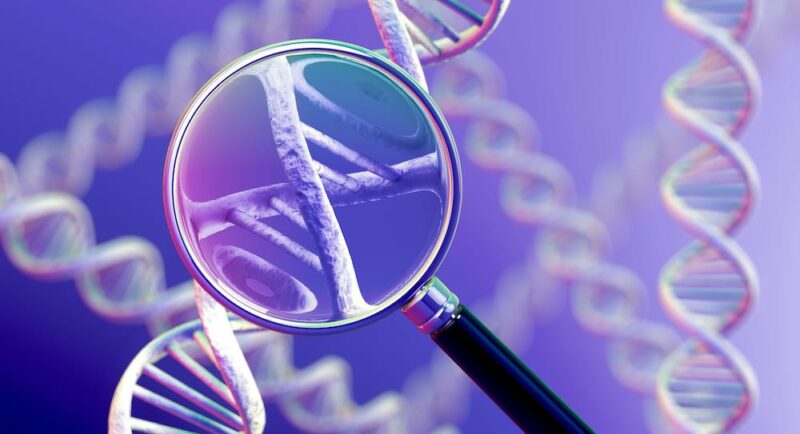DNA analysis of thousands of tumours in the 100,000 Genomes project has uncovered a ‘treasure trove’ of 58 new mutational signatures causing cancer. The study, published in Science, 21 April, showed that while there are common signatures for cancers arising in the same organ, there are also rare signatures that span different cancers. The investigators have also developed a new tool allowing clinicians to use this information to benefit patients.
Although individual cancer cells contain thousands to hundreds of thousands of mutations, only a handful will have directly contributed to development of the tumour. All the other thousands of mutations might not influence the tumour, yet offer clues to how the cancer developed and progressed. When looking at all these mutations, one can see recurring patterns called ‘mutational signatures’, which provide clues about whether the patient has had past exposure to environmental factors that can cause cancer, such as smoking or UV light, or whether there are defects with the DNA repair systems characteristic of various cancer cells.
“The reason it’s important to identify mutational signatures is because they’re like fingerprints at a crime scene, they help to pinpoint cancer culprits,” says Serena Nik-Zainal, leader of the study and a professor of genomic medicine and bioinformatics at the University of Cambridge. “Some mutational signatures have clinical or treatment implications, they can highlight abnormalities that may be targeted with specific drugs or may indicate a potential ‘Achilles heel’ in individual cancers.”
What has been unique about the 100,000 Genomes cancer project is the sheer scale of the approach involving 12,222 cancer patients with 19 different tumour types. “The infrastructure of the project integrating Genomics England with the NHS, allows the potential for clinicians to access discoveries to inform personalised medicine decisions for individual patients,” says Andrea Degasperi, the first author, from the Hutchison Research Centre, Cambridge.
For the study, Nik-Zainal and colleagues analysed whole-genome sequences (WGS) of NHS cancer patients recruited from 13 English genomic medicine centres. Genomic data was provided by the 100,000 Genomes Project, an England-wide clinical research initiative sequencing 100,000 whole genomes from 85,000 patients affected by rare disease or cancer. “The reason for the mismatch between whole genomes and the overall number of patients in the study is that the subgroup with cancer needed to have their normal genes sequenced as well as the cancer genomes to identify differences,” explains Degasperi, a computational biologist who originally trained at the University of Trento, Italy.
For each cancer patient, the first step was to define their individual cancer ‘mutational catalogue’ which contains a compact and meaningful representation of its mutations. In this particular study, the authors considered single and double base substitutions (SBS and DBS), and derived their associated mutational signatures.
Next, the team performed ‘matrix factorization algorithms’ to identify a common set of patterns, known as ‘mutational signatures’, defined as imprints of DNA damage and the repair processes operating during tumorigenesis. “The idea here is to identify a reference mutational signatures set containing mutations common to many tumours of the same type and also the rare mutations that occur across tumours of different types,” explains Degasperi.
To validate findings, the team performed independent analyses by looking for mutational signatures in two publicly available cohorts – the International Cancer Genome Consortium (ICGC), involving 3001 primary cancers, and the Hartwig Medical Foundation, involving 3417 metastatic cancers.
Finally, the investigators developed a computer-based tool, known as Signature Fit Multi-Step (FitMS), to enable clinicians to utilise the new information to diagnose and treat patients more effectively. “The idea here is to build a catalogue for each new patient, and then fit the reference mutational signatures set. This should give clinicians an idea about which of the common and rare mutational signatures are relevant for that individual,” explains Degasperi.
Results revealed 82 high-confidence single-base substitution (SBS) reference signatures and 27 high-confidence double-base substitution (DBS) reference signatures. When compared with previously reported mutational signatures the analysis revealed 40 SBS and 18 DBS previously unreported signatures. The team found also found ~ 30 rare signatures that occurred across tumours in different organs. “For example, we had a very striking signature that was present only in one breast and one bladder cancer,” says Degasperi.
There are different types of causes of mutational signatures. “Some are external/ environmental, allowing us to identify people at risk of getting cancer e.g. smokers. This allows us to avoid the source of mutation or screen more frequently. Other causes are internal to the cell and specific to the cancer cell, like a defect in DNA repair, which means that they offer an opportunity to use a selective drug, which is effective against the cancer cell with the defect but harmless to healthy cells,” says Degasperi.
The next stage of the project will be to try to establish causality for the new mutational signatures by attempting to reproduce them in the laboratory, for example by exposing healthy cells to mutagens. The hope is that the approach will lead to a greater mechanistic understanding of the mutational processes underlying carcinogenesis, which could have public health implications for prevention.
Ultimately, the initiative also opens the way for cancer treatments to be stratified according to ‘mutational signatures’ of individual patients as opposed to classical methods of histological based treatment decisions based on organs of origin. In 2019, in Molecular Case Studies the team described a patient with metastatic angiosarcoma, with none of the ‘classical drivers, who progressed after three lines of standard treatment. Mutational analysis revealed a mutational signature associated with immune checkpoint blockade, allowing the anti-PD-1 monoclonal antibody pembrolizumab to be prescribed off-label and effectively treat the patient.
Mutational signatures, explains Degasperi, can provide a more extensive picture for personalised medicine than individual mutations since they provide a readout of the overall DNA repair defects, making it potentially a more accurate way to stratify patients and select the most appropriate treatment.
So far, the focus has been on substitutions, but in future there are other types of mutational signatures (such as rearrangements or deletions) that the team plan to explore.












